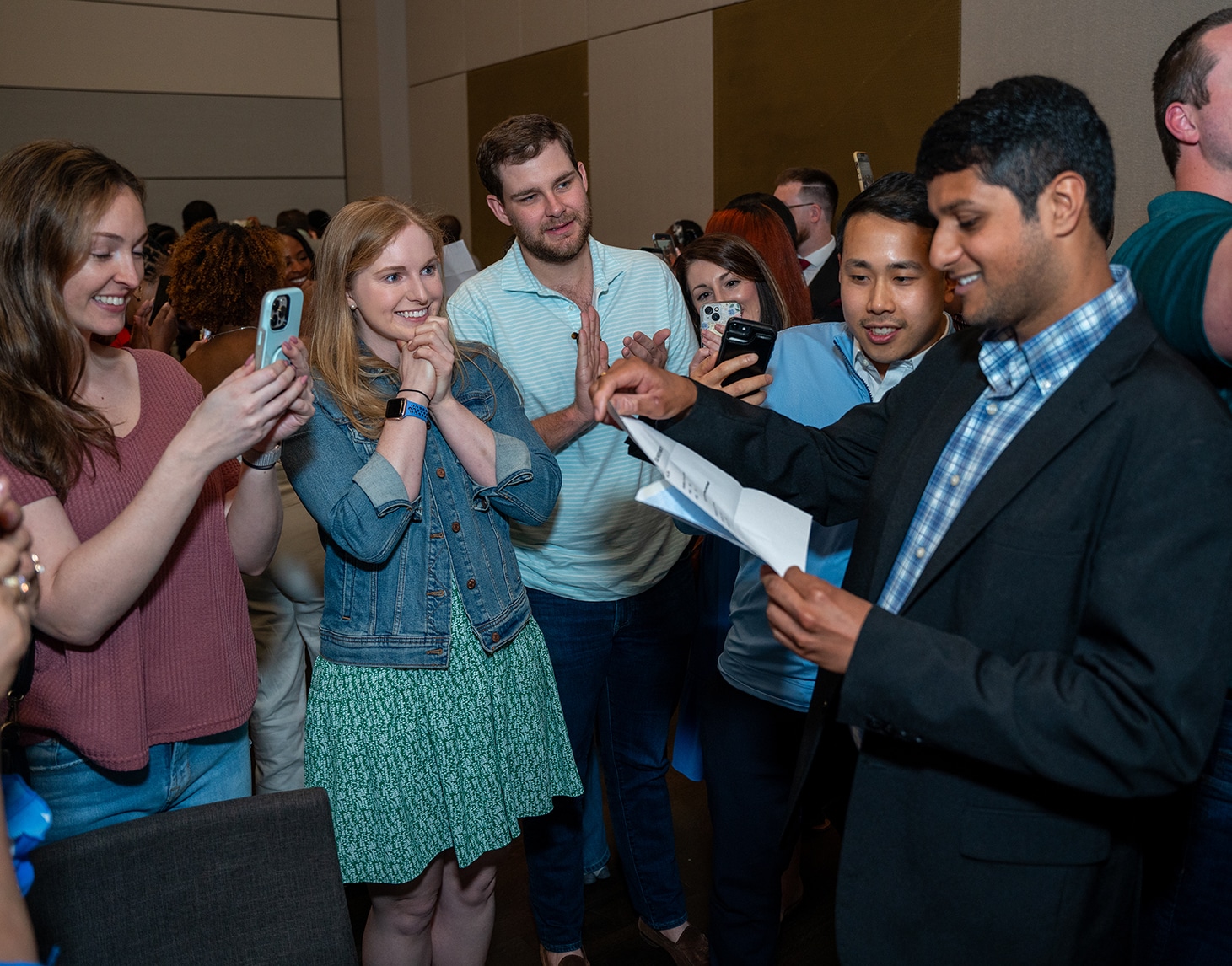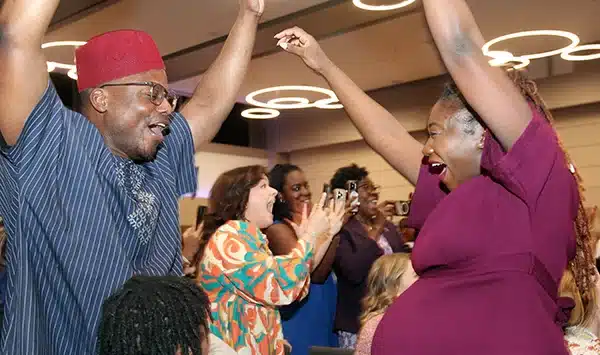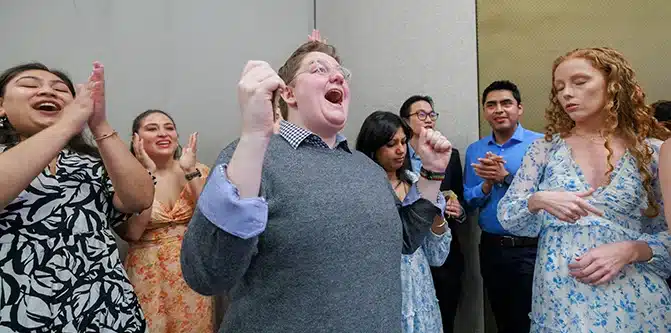In a ceremony more festive than formal, fourth-year medical students in the Brody School of Medicine at East Carolina University learned March 15 where they will spend the next three to seven years completing residency training.
This year, 100% of Brody’s 79 members of the Class of 2024 — which began its medical school journey during the COVID-19 pandemic — matched with a residency program.
The traditional event is arguably the pinnacle of the medical school experience for Brody students.
Before they opened their envelopes to reveal their next stop, the students were presented to the audience of family, friends and members of the Brody community to strains of music they each selected as they marched — or danced — across the stage in the ballroom of ECU’s Main Campus Student Center.

“Match Day is such a special time for these students from the Brody School of Medicine, all of whom have worked incredibly hard to reach this exciting moment,” said Dr. Michael Waldrum, dean of Brody and CEO of ECU Health. “Our medical students, by virtue of the education they receive here at Brody, are uniquely prepared to provide high-quality, human-centered care to the patients they will soon serve as part of their residency training and beyond. I want to extend a heartfelt congratulations to the Brody Class of 2024. We are grateful for the positive impact they will have on the lives of so many.”
Dr. Jason Higginson, executive dean of the Brody School of Medicine, said the class of 2024 represents Brody’s mission — a diverse group of students who come from all parts of the state, who will largely return to serve North Carolina as doctors.
“We have a 100% match rate, well above the national rate, which is also a testament to our faculty and staff,” Higginson said. “About 50% of our graduates are staying in North Carolina, which is our primary mission, and about 20% are staying locally.”
One of Brody’s secondary missions is getting future doctors to practice primary care, and half of the class of 2024 have committed to being on the front lines of health care.
“They are great kids. It’s one of our best classes ever,” Higginson said.
A perfect match
Before he even knew the mission carved out by the Brody School of Medicine to reach underserved patients and address health disparities, Connor Haycox was intent on improving lives.
During his undergraduate years at Davidson College, Haycox volunteered and interacted with patients from underserved communities and saw himself as a future physician to help bridge gaps in care.
“I wanted to go into medicine to help address that,” said Haycox, a native of Chapin, South Carolina. “I could see myself as a primary care physician; I figured I could do the most good for people on the front lines.”
Haycox matched in family medicine at ECU Health.
“I know this is where I’m supposed to be,” he said.
After college, Haycox spent two years completing a MedServe fellowship — an AmeriCorps program through which fellows assist in key primary care services and engage in community health work including outreach, education and other projects that impact community health. During the fellowship, Haycox worked in a rural family medicine practice in Benson, North Carolina, where he witnessed “the breadth of the problems patients presented,” he said. “I wanted to be able to meet them in their particular situation and help them maximize their health goals. I really started to see myself in that role.”
By the time Haycox was ready to take on medical school, he knew Brody was the place for him. His goals and his philosophy naturally aligned with the school’s mission, making it a perfect fit.
“The mission of Brody to develop family medicine doctors to serve the state was really a natural transition for me,” he said. “It just made the whole process that much more streamlined. I saw myself here from the start.”
Haycox sees himself serving eastern North Carolina long term — especially since his wife, Dr. Natalie Malpass, a 2022 Brody graduate, is completing a family medicine residency with ECU Health. The two met during Haycox’s stint in Benson, and that experience has cemented his view of medicine as part of teamwork and partnership.
“I think it’s invaluable to have a partner in medicine,” Haycox said. “It’s such a challenging field and an emotional investment, and I feel like having someone to be able to talk to about the things you see has helped me professionally, but it’s more just being able to walk through life with someone who understands.”
Working with the Benson clinic to respond shortly before medical school to help the team coordinate the practice as a COVID-19 testing site also showed him the importance of taking unforeseen circumstances and transforming them into something meaningful.
“Medicine is personal, and we adapt,” Haycox said. “We do that because we need to for our patients. The pandemic was a whole learning process, and it taught me that we may not have all the answers, but we can learn with our patients how to best come out.”
Navigating the pandemic with his classmates also taught him lessons about adaptation, appreciation and taking advantage of opportunities that presented themselves over the years. Haycox served as an anatomy tutor and was part of Brody’s Medical Education and Teaching Distinction Track cohort — which prepares students to be effective medical educators and develops their interest in academic medicine.
“I can see myself going into academic medicine in the future, so I wanted to develop those skills,” he said.
As for the culmination of his Brody experience, Haycox is excited to celebrate his next step alongside his family. For him, Match Day is the beginning of a new adventure in primary care and family medicine.
“Medical school is a long haul, so I’m excited to celebrate with my family,” he said. “Today, all of this kind of becomes more real.”
From motherhood and maternal medicine
For most medical students, finding out where they will complete their residency during Match Day is plenty to celebrate. For Ahoua Dembele, that’s just the start of the day’s festivities as her family is in town for an equally joyous celebration: a baby shower for her third child, due in just four weeks.
Dembele moved with her family from her home in Ivory Coast to Senegal, then attended boarding school in France. She returned to Africa’s north coast, this time Tunisia, with her family for six years before finally settling in Charlotte after graduating high school in 2011.
When Dembele arrived in the States, she had some measure of command of a number of languages – French, Arabic and an understanding her first language, Dyula, a dialect of Mande, but she didn’t speak English. She enrolled at Central Piedmont Community College for a crash course in a new language and started her educational journey.
After a few years at the community college and managing a pizza restaurant, she transferred to UNC Charlotte, where she graduated with a degree in biology because she was always fascinated with science.
She soon had her first son and worked for a while as a medical assistant in a doctor’s office in Charlotte.
Dembele was accepted as a medical student at Brody just before the COVID-19 pandemic complicated just about every aspect of life – especially education. The disconnected learning was tough, but she excelled, especially in light of having her second son just before starting school and getting married to her long-time partner who was frequently out of the country for business.
“I started medical school when my oldest was 2 or 3 and my youngest was 1. Daycare regulations were a little weird and my school was, too. We couldn’t go to Brody because of COVID, so I had to find ways to study,” Dembele said.
Her mother stayed with her to help with the boys and when her husband was home “he would do everything so that I could find places to study, but it was hard because they still need their mom, so I had to find ways to at least do bedtime every day.”
Dembele matched to undertake her residency in obstetrics and gynecology at ECU Health. She wants to make a difference in the lives of mothers and babies, especially after witnessing health conditions in eastern North Carolina through her clinical rotations. She hopes to sub-specialize in maternal and fetal medicine.

“Something about pregnancy has always attracted me. It’s miraculous, phenomenal, that a body can do that,” Dembele said. “It’s mind blowing. I’ve seen a lot of deliveries, but I’m always amazed, every time, even at my own.”
She credits Dr. Jill Sutton, a clinical associate professor at Brody who specializes in obstetrics and gynecology, with invigorating her desire to focus on pregnancy and women’s health.
“The first time she taught us she was so bubbly, so excited and so joyful when she was talking about pregnancy,” Dembele remembered. “Her enthusiasm, her devotion. I was like, ‘Oh my God, this is who I want to be.’ She’s been a mentor for a long time, and I hope to stay here and continue to train with her.”
At Match Day, Dembele was joined by her husband, her boys and her mother, who traveled from Wisconsin, where they now live. She beamed with pride amidst a family that had travelled so far, and made real sacrifices, to stand with Ahoula as she tore open the envelope that revealed where the next few years of their lives would play out.
Dembele will have a few weeks with her newest child before starting residency as she and her husband planned — calculated — the pregnancy meticulously.
She is a scientist, after all.
‘That’s the kind of doctor I want to be’
The few minutes it takes for the National Resident Matching Program’s mathematical algorithm to match applicants and programs across the country can be daunting for many medical students to think about — but for Emmalee Todd, reflecting on those fateful moments feels a bit zen.

“I think that no matter where I end up, I will find a way to be happy and fulfilled and feel like I’m moving in the direction I want to move in,” Todd said. “I feel like regardless of where I have ended up, I’ve been able to find my own path in that setting.”
And they will do it again.
Todd, who crossed the stage to the inspiring lyrics of Shakira’s “Try Everything” from the movie “Zootopia,” was joined by their parents and girlfriend Friday as they opened their envelope to reveal that they matched in internal medicine and pediatrics — known as “med-peds” — at the University of Maryland.
“I’m really excited,” Todd said. “Maryland made a really good impression on me. I’m excited for it.”
Todd’s journey through medical school was inspired by leadership experiences, bonding with fellow students and learning to adjust to what comes in ways that ensured not only success but a lesson to carry with them into the next chapter. A member of Brody’s first class to begin medical school under “pivoted” protocol because of the COVID-19 pandemic, Todd said their class made up for lost time later.
“For most of us, 2020 was pretty lonely,” they said. “We were thrown into this whole new level of work and new level of stress, and we wanted to be able to lean on our classmates.”
The Class of 2024 leaned into the changes, however, and started forming bonds as they interacted during some classes and labs and outside of school. Those bonds have stood the test of time and have been a vital part of Todd’s experience — which really began when they were an undergraduate at Northeastern University in Boston studying behavioral neuroscience.
Todd became an emergency medical technician and got a firsthand look at medical care — after getting a taste of the health care field over the years from their mother, Dr. Karen Todd, a pediatrician and Brody alumna herself. That exposure, coupled with making friends from all over the country and world, helped lead Todd toward a career in health care.
“I was meeting people from places I’d never been before,” they said.
After working for two years as a medical assistant, Todd brought that same energy to Brody, where they could see themselves as part of a smaller class.
“It really came down to the vibes,” they said. “It was one of the few places I interviewed where I felt a connection to the people, students and faculty right away. I could see myself here.”
Todd has thrived, taking on leadership roles including class diversity representative, executive treasurer and vice chair on the Medical Student Council, an elected organization that represents the medical student body as a voice in education, political and social interests.
“I got nominated our first year and decided I was going to run,” Todd said. “I got elected, and there I was. When you’re asked for your input, it’s because someone thinks your input is valuable. It is an honor, the trust [my classmates] have placed in me to be a voice for my class, to speak up and advocate for changes, policies and guidelines that are going to improve or rectify parts of our experience.”
Todd, who was drawn to med-peds because of an experience during a third-year rotation.
“I was trying to be open-minded, though I initially thought I wanted to do emergency medicine,” Todd said. “During my internal medicine rotation, I spent two weeks in the med-peds clinic and fell in love with the feel of it, with the attendings and residents and their personalities and the way they thought about medicine and approaching their patients. The more I got to interact with them, the more it reinforced that that’s the kind of doctor I want to be. They were passionate about trying to do the right thing for their patients.”
Drawing upon every memory and experience they gained along the way — from undergrad to Match Day — Todd is ready to embrace the next step and to take advantage of all the lessons waiting on the horizon.
“I thought when I was in undergrad that I wanted to get my Ph.D.,” they said. “I love neuroscience; I loved feeling like I was on the cutting edge of the frontier of knowledge, pushing into something that people have never known about before. But the more I got into the clinical environment, I really liked the detective work aspect of medicine, the team feel of it. All of the members of the health care team bring their own skills to the table but have the same goal, which is making the patient better.”